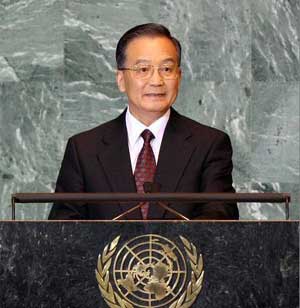认识一个真实的中国
——在第65届联大一般性辩论上的讲话
中华人民共和国国务院总理 温家宝
2010年9月23日 纽约
Getting to Know the Real China
--Statement by H.E.Wen Jiabao
Premier of the State Council of the People's Republic of China
At the General Debate of the 65th Session of the UN General Assembly
New York, 23 September 2010

主席先生,各位同事:
Mr. President,
Dear Colleagues,
中国是联合国大家庭中的一员,中国的发展变化受到国际社会的高度关注。我愿就如何认识一个真实的中国,谈谈我的看法。
China is a member of the big family of the United Nations, and China's development and changes have attracted worldwide attention. I wish to take this opportunity to share with you my observations on how one should get to know the real China.
中华人民共和国成立以来,特别是改革开放30多年来,中国这个古老的东方大国发生了翻天覆地的变化。国家经济实力和综合国力大为增强,人民生活显著改善,社会文明程度大幅提升,国际交流与合作不断扩大。中国已经实现了由解决温饱到总体上达到小康的历史性跨越。
Since the founding of the People's Republic, and especially since the start of reform and opening up more than 30 years ago, profound changes have taken place in China, a big, ancient country in the East. Its economic and overall national strength has substantially increased. The livelihood of its people has markedly improved. Its social and cultural programs have made considerable progress. And its exchanges and cooperation with the outside world have kept expanding. In sum, my country has made a historic leap from mere subsistence to moderate prosperity.
中国对自己通过艰苦奋斗而取得的成就感到自豪。同时,我们对今天中国在世界上的位置和作用,也有着清醒的认识。
We in China are proud of our achievements accomplished through strenuous efforts. At the same time, we are clear-headed about our place and role in today's world.
中国国内生产总值位居世界第三,但人均水平较低,只相当于发达国家的十分之一左右。中国经济已保持30多年的快速增长,但进一步发展受到能源、资源和环境的制约。中国若干重要产品产量位居世界前列,但总体上仍处于全球产业链的低端。中国已经成为国际贸易大国,但出口产品技术含量和附加值低,核心技术仍然大量依赖进口。中国沿海地区和一些大中城市呈现出现代化的繁荣,但中西部和广大农村的不少地方仍然相当落后,还有1.5亿人口生活在联合国设定的贫困线之下。中国民生有了很大改善,但社会保障体系不健全,就业压力很大。中国社会政治生活日趋活跃,公民基本权利得到较好的维护,但民主法制还不够健全,社会不公和贪污腐败等问题依然存在。
China's GDP is the third largest in the world, but in per capita terms, it is only one-tenth of that of developed countries. China has enjoyed over 30 years of fast growth, but its further development faces energy, resources and environmental constraints. China is a leading producer of many important products, but it remains at the lower end of the global industrial chain. China is a big trading nation, but its exports are low in technology content and value added. In many cases, we have to rely on imports to meet the demand for core technologies. China's coastal areas and some of the big and medium-sized cities thrive in modernization, but many places in the central and western regions and the vast rural areas are still rather backward, and we have 150 million people living below the poverty line set by the United Nations. The Chinese people's livelihood has made significant improvement, but we do not yet have a full-fledged social security system, and we are confronted with high employment pressure. Our people are more and more actively engaged in the country's social and political development, and citizens' basic rights and interests are better protected, yet our democracy and legal system still have room for improvement and such social ills as inequity and corruption still exist.
中国现代化走到今天,先进落后并存,新旧矛盾交织,面临诸多前所未有的挑战。中国仍然处于社会主义初级阶段,仍然属于发展中国家。这就是我们的基本国情,这就是一个真实的中国。
China, which has come a long way in modernization, is fairly advanced in some areas of development but remains backward in others. And it faces unprecedented challenges brought by problems both old and new. Taken as a whole, China is still in the primary stage of socialism and remains a developing country. These are our basic national conditions. This is the real China.
中国的战略目标是到本世纪中叶,基本实现现代化。展望今后几十年,中国人民将坚定不移地沿着改革开放、和平发展的道路前进。这条道路改变了中国的命运,给全体人民带来了福祉。我们必须坚持它、完善它,而没有任何理由改变它。
China has set the strategic goal of basically achieving modernization by the middle of this century. Looking into the coming decades,the Chinese people will continue to move forward along the path of reform and opening up and peaceful development. This path has changed China's destiny and has benefited people throughout the country. We must stay on this path and make further improvement. There is no reason whatsoever for us to deviate from it.
中国将继续集中精力发展经济。发展仍然是中国的第一要务,是解决一切问题的基础。中国的发展主要依靠自己的力量。中国工业化城镇化的推进,数以亿计农民进入城镇,将创造有史以来最为巨大的国内需求,开辟极其广阔的市场和发展空间,为中国和世界经济增长提供持久而强劲的动力。中国将下大力转变经济发展方式,调整经济结构,走出一条均衡和可持续的发展道路。
China will continue to focus on developing the economy. Development is our top priority, as it constitutes the basis for addressing all issues. We will mainly rely on our own efforts in pursuing development. With the progress in China's industrialization and urbanization, hundreds of millions of farmers will move to towns and cities. This will create more domestic demand than ever, open up broad market and development space, and serve as a powerful engine sustaining the growth of the Chinese economy and the world economy at large. We will work hard to transform the economic development pattern, restructure the economy and set out on a path of balanced and sustainable development.
